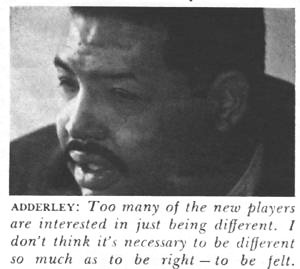![]()
THE PLAYBOY PANEL: JAZZ-TODAY AND TOMORROW |
![]()
 |
From the February 1964 issue .Click on the bunny to see the Front Cover Magazine , (very soft)
PANELISTS
Go to the (long) conversation (HTML)
download the text in word format (doc) , 100Ko
JULIAN "CANNONBALL" ADDERLEY is an urbane alto saxophonist and leader who has achieved sizable popular success during the past five years. He is also a recording director and has helped many musicians get their first chance at national exposure. Adderley has termed his music "modern traditional," indicating his knowledge and respect for the jazz past as well as his interest in continuing to add to the music. Through his lucid, witty introductions at concerts, festivals and night clubs, Adderley has become a model of how to make an audience feel closer to the jazz experience.
DAVE BRUBECK, the rugged, candid pianist, leader and composer, has won an unusually large audience to the extent of even having had a number of hit single records. Instead of coasting in a familiar groove, however, he has continued to experiment; in recent years he has turned to time signatures comparatively new to jazz. Although Brubeck is characteristically friendly and guileless, he is a fierce defender of his musical position and does not suffer critics casually.
JOHN "DIZZY" GILLESPIE is now recognized throughout the world as the most prodigious trumpet player in modern jazz. He is also the leading humorist in jazz and he has demonstrated that a jazz musician can be a brilliant entertainer without sacrificing any of his musical integrity. He is now leading one of the most stimulating groups of his career, and is also engaged in several ambitious recording projects.
RALPH J. GLEASON, one of the few jazz critics widely respected by musicians, is a syndicated columnist who is based at the San Francisco Chronicle (in our October issue, we erroneously placed him on the Examiner staff). He has edited the book Jam Session; has contributed to a wide variety of periodicals, in America and abroad; and is in charge of Jazz Casual, an unprecedentedly superior series of jazz television shows, distributed by the National Educational Television Net work. As a critic, Gleason is clear, some times blunt, and passionately involved with the music.
STAN KENTON is a leader of extraordinary stamina and determination. He has created a distinctive orchestral style and, in the process, has given many composers and arrangers an opportunity to experiment with ideas and devices which very few other band leaders would have permitted. The list of Kenton alumni is long and distinguished. In a period during which the band business has been erratic at best, Kenton is proving again that a forceful personality and unmistakably individual sound and style can draw enthusiastic audiences.
CHARLES MINGUS, a virtuoso bassist, is one of the most original and emotionally compelling composers in jazz history. His groups create a surging excitement in producing some of the most startling experiences jazz has to offer. He is also an author, and has completed a long, explosive autobiography, Beneath the Underdog. An uncommonly open man, Mingus invariably says what he feels and continuously looks for, but seldom finds, equal honesty in the society around him.
GERRY MULLIGAN has proved to be one of the most durable figures in modern jazz. In addition to his supple playing of the baritone saxophone, he has led a series of intriguingly inventive quartets and sextets as well as a large orchestra which is one of the most refreshing and resourceful units in contemporary jazz. Mulligan also has acted in films and is now writing a Broadway musical. He has a quality of natural leadership which is manifested not only in the way all of his groups clearly reflect his musical personality, but also in the fact that whenever jam sessions begin at jazz festivals, Mulligan is usually in charge.
GEORGE RUSSELL has emerged during the past decade as a jazz composer of exceptional imagination and originality. He has recorded a series of albums with his own group, and these represent one of the most impressive bodies of work in modern jazz. He is also a teacher, and among his students in New York are a number of renowned jazzmen. A pipe- smoking, soft-voiced inhabitant of Green wich Village, Russell is not one of the more prosperous jazzmen, despite his stature among musicians, but he refuses to compromise his music in any way.
GUNTHER SCHULLER is a major force in contemporary music - both classical and jazz. He is one of the most frequently performed American composers, has been awarded many commissions here and abroad (his most recent honor, a Guggenheim fellowship), and is also an accomplished conductor. For ten years, Schuller was first French horn with the Metropolitan Opera Orchestra, but now devotes his full time to composing, conducting and writing about music. He has had extensive experience in jazz and is largely responsible for the concept of "third-stream music." He is currently working on an analytical musical history of jazz for Oxford University Press. A man of seemingly limitless energy, Schuller is expert in many areas of music as well as in literature and several of the other arts.